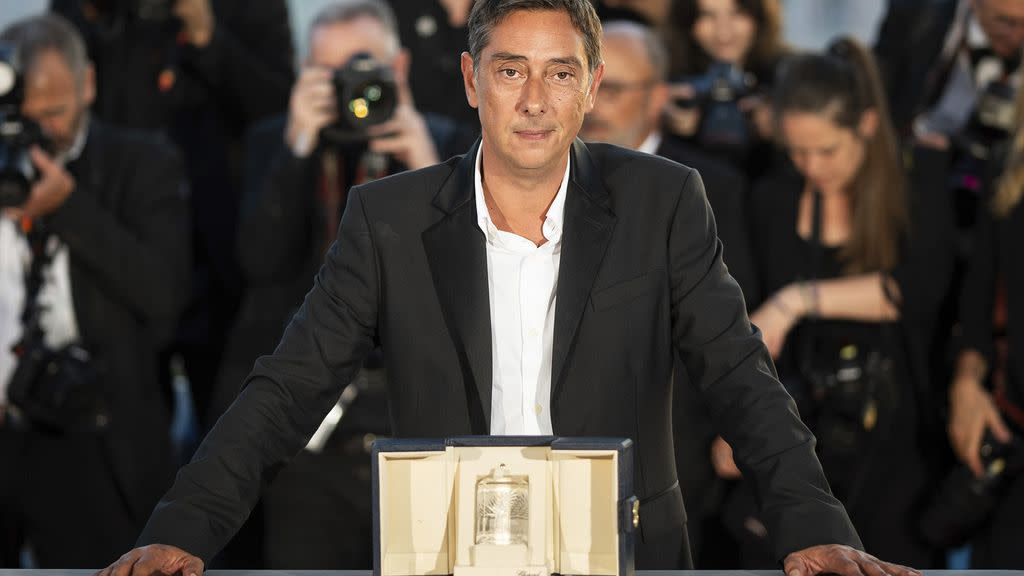Exclusive: Miguel Gomes "Grand Tour" and what it means to win the Cannes Best Director prize

It's the highest accolade ever for a Portuguese film at Cannes: while the inclusion of Miguel Gomes' "Grand Tour" in the official selection for the Palme d'Or was already a major achievement, the Best Director award was the icing on the cake.
It was the career crowning glory of the 52-year-old director who has been a regular presence at top festivals over the last decade and a half with films such as "Tabu" (2012) and the "Arabian Nights" trilogy (2015).
"You feel a lot at the same time," Gomes tells Euronews Culture. "It's rare for a Portuguese film to be nominated, to win an award even more so."
Miguel Gomes grew up watching Portuguese cinema and identifies with it wholeheartedly: "Portuguese cinema has a history, since the 1960s, that gives it an identity. It's an identity that is sometimes contested inside, because they say that Portuguese films are difficult."
"Ever since I was a little boy, I got used to seeing Portuguese cinema and thinking 'it's possible to do this in Portugal'. That was very striking and decisive for me. Maybe I'm saying something heretical, but I feel a greater sense of belonging to Portuguese cinema than to the country itself."
"Grand Tour" is the result of a long journey
"Grand Tour", which Gomes sees as a "classical film of adventure", is the result of the collage of two distinct but complementary processes: On the one hand, the filming that he, along with a very small crew, did during a long trip through Asia in the early months of 2020, before the pandemic forced them to postpone their plans (the part in China was filmed in 2022, after the restrictions were lifted).
The trip began "without there even being a script for the film," he says. On the other hand, filming took place in 2023 with the actors in the studio, where everything had already been planned and a team of more than 100 people were working: "The studio is the cinema space par excellence," he says.
It is from the combination of these two concepts that the film is born: "There are two possibilities in cinema," he says. "To record the world as we know it, to put a camera in a certain place and record what is in front of us or, on the other hand, to invent the world - to invent a sunset or a sunrise in a space without windows, which is a studio."
The story takes place in Asia in 1918, "but this film is much more than the story, because it was a great challenge to film it," explains Gomes.
It all begins with a man, a British official in Burma, who is waiting for his fiancée on the quayside. Panicked, he decides to flee to Singapore, where he receives a telegram from his fiancée saying that she is coming. He flees again and passes through several countries, always with her on his trail. The second part of the film tells the story from the woman's point of view. The result is a film in which the (deliberate) contrast between the period film and the images of present-day Asia stands out.
"Rebellion in the Backlands"
"Grand Tour" isn't due to be released in the main markets until after the summer. For the time being, the film's critical success and the prize it won at Cannes could be a ticket for Gomes to secure funding for his long-dreamed-of project to bring Euclides da Cunha's "Os Sertões" (Rebellion in the Backlands) to the big screen - a book that is extremely difficult to transpose to film, as it is both a war chronicle and a botanical treatise.
First published in 1902, the book is set in the state of Bahia (Brazil) at the end of the 19th century and portrays the conflict between the Brazilian army and the followers of the prophet António Conselheiro, who were opposed to the establishment of the Republic.
It's a project that Miguel Gomes has been working on since before embarking on "Grand Tour" and which has been postponed by several vicissitudes: Firstly, by the arrival of Jair Bolsonaro in power, since his government has almost completely paralysed cinema funding. Secondly, the Covid pandemic. With both problems overcome and financing talks resumed, the film finally seems to be on track to be made.


